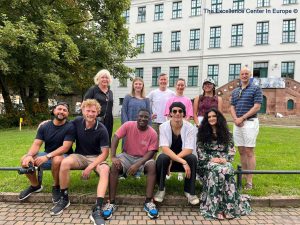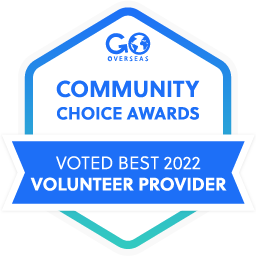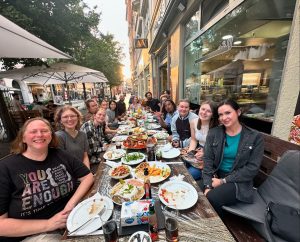Have you ever wondered what a typical day looks like for volunteers teaching English and learning German at The Excellence Center, and who these volunteers are? The Excellence Center attracts curious individuals of all ages to come and contribute to the community of Halle and inspire others. Here, individuals from around the world come together to teach, learn, and contribute to a vibrant, intercultural community.
Ranging in ages from 17 to late 30s, these volunteers come from a wide variety of backgrounds and life experiences. What unites them is a shared commitment to education, cultural exchange, and supporting others, especially refugees and newcomers seeking to build a life in Germany. Continue along to read exclusive interviews with our June 2025 volunteers, and understand how they each make a meaningful impact on The Excellence Center.


Interview with Julianne
I: Tell us about yourself
J: My name is Julianne, I’m 24 years old and I come from London. I graduated university in 2023 and am currently on a gap year.
I: What drew you specifically to volunteer at a language center, as opposed to other types of organizations?
J: Two things, the first is a personal passion for language learning. The second is that language is such a barrier for refugees trying to integrate, so I think it’s important to support them and bridge the gap. I find that the Excellence Center combines my love for languages, understanding language, and helping others.
I: How does your own experience with language learning shape the way you support students?
J: As a language student myself, I understand the difficulties of learning a new grammar and vocabulary, and this has made me a more patient person. I can empathize with students, as my experience with learning a foreign language has taught me strategies and tricks that I can suggest to my students.
I: What was the most unexpected challenge you faced while volunteering, and how did you handle it?
J: Having a variety of students of different ages and at different points in their english learning journey, being able to adapt to their levels and learning styles, while making the lesson engaging
Interview with Abby
I: Tell us about yourself
A: My name is Abby, I’m 23, I live in Utah USA and I’m a student studying geography and international studies.
I: Was there a moment or experience that made you feel personally invested in language education?
A: Being a third culture kid and growing up in many countries, I’ve always been interested in the importance of linguistics in refugee integration, language acquisition


I: How do you navigate cultural or linguistic misunderstandings when they come up?
A: Having a lot of patience and Google Translate
I: What kinds of conversations or shared moments stood out as especially powerful or human?
A: One of my students and I are at a similar level in German, so despite me teaching him English we often speak in German about the situation in Syria. He spoke about the challenges of integrating into German society as someone coming from a country where basic human rights are not fully met. He explained that while many Germans are able to satisfy all levels, from basic needs to self-actualization, Syrians often arrive having only had access to the most fundamental ones, like survival and safety.
Despite this, they are often expected to adapt quickly and seamlessly, even while carrying the weight of trauma. This gap makes cultural integration difficult, limits their ability to navigate complex systems, and increases vulnerability to prejudice. Hearing this perspective was deeply eye-opening and incredibly informative.
Interview with Alex
I: Tell us about yourself.
A: My name is Alex, I’m a 21-year-old college student studying psychology and neuroscience at Ohio State University, and I’m from the United States.
I: How do you think your presence as a volunteer shaped the atmosphere or experience at the center?
A: I try to bring a fresh, unbiased perspective by interacting with different people. I think nuance is very important in understanding how different people coexist in the world, and that has definitely helped me maintain an open outlook on my experience at the center.
I: If someone were to observe your day at the center, what do you think would surprise them most?
A: Definitely how lenient it is. There is little structure, but this allows for exploration, and as volunteers we can do anything and be ourselves. You basically create your own experience which allows you to gain independence.


I: Are there specific changes you’ve seen in students—or even in yourself—that you’d attribute to this experience?
A: At first, students are shy, a little scared, and don’t really know what to expect. However, as you continue they become open and tell you about your life, and you create a connection. I definitely became more open-minded due to experiencing living in a foreign country by myself, experiencing the culture, and reminding myself that things are different here.
Interview with Hayley
I: Tell us about yourself – age, country of origin, what they do in life
H: My name is Hayley. I’m 38 years old, from Colorado USA, and I am a history teacher.
I: What’s the most surprising word or expression you’ve learned through your students?
H: I wouldn’t have a specific word but rather I was pleased to see how helpful it is to have actual informal conversations rather than focusing too much on grammar.
I: Can you tell me about a moment that made you rethink your assumptions about language, teaching, or people?
H: As a teacher back at home, I definitely learned to be more flexible. I teach students with whom I have no language in common, and this made me more creative, as I had to try to find ways to communicate and understand each other nonverbally. It stimulated my brain and expanded my knowledge on teaching.
I: Did you ever feel like you were learning as much as you were teaching? In what ways?
H: Yes, constantly. I always have to learn many smaller new words only to get a point across. Some of my students even speak better German than me, so from them I hear words I had only previously read and this turns me into a sort of student in a way.


Interview with Ruby
I: Tell us about yourself – age, country of origin, what they do in life
R: My name is Ruby, I’m 23, from the United States, I work as a teacher in a middle school for kids aged 11-14 and I hope to teach history one day.
I: How do you think learning a new language changes the way someone sees themselves—or the world around them?
R: Learning a new language showed me that I can accomplish things I didn’t know I could. For a long time I thought English would be my only language, but starting to learn German showed me I have potential, a purpose in life, and that I can always expand my knowledge.
I: What strategies—or mindsets—helped you stay motivated when students were struggling, or when progress felt slow?
R: I mostly try to connect the language learning process to things they’re interested in, whether these be shows or songs. It definitely helps that many Germans are familiar with some English media and therefore understand the connections.
I: Do you have a ritual before starting your sessions? A favorite pen, song, or coffee spot?
R: I’m a pretty anxious person, especially around new people, so I usually relax by doing breathing exercises.
Conclusion
Our June 2025 volunteers are truly special. They demonstrate that no matter what age or nationality you are, we can all come together for a good cause. The volunteers at The Excellence Center in Halle are as diverse and dynamic as the community they serve. From students and travelers to experienced teachers, each person brings their own story, skills, and passion to the table. What unites them is a shared belief in the power of language as a tool for connection, empowerment, and integration.
Through both teaching and learning, these volunteers engage in deeply human exchanges—moments of laughter, challenge, cultural insight, and mutual growth. Their experiences remind us that language learning is never one-sided; it is a collaborative journey that changes both teacher and student alike. As these stories show, volunteering is not just about giving—it’s about discovering who you are, and who you can become, through the eyes of others.
Tags: Arabic courses in Germany, Internship in Germany, Volunteer in Germany




